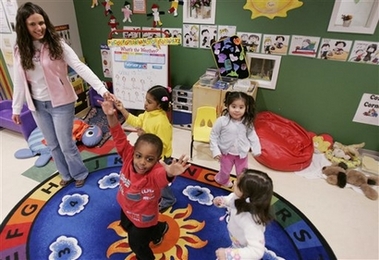| @wehaitians.com | |
No one writes to the tyrants | |
HistoryHeads/Not Just Fade Away |
| Correspond with us, including our executive editor, professor Yves A. Isidor, via electronic mail: |
| letters@wehaitians.com; by way of a telephone: 617-852-7672. |
| Want to send this page or a link to a friend? Click on mail at the top of this window. |
|
 |
|
| Posted Monday, March 26, 2007 |
| Study links care to problem behavior |
| By Kevin Freking, Associated Press Writer |
WASHINGTON, Mar. 26, 2007 - The more time that children spent in child care, the more likely their sixth grade teachers were to report problem behavior.
 |
| Study links child care to problem behavior. (Photo/The Associated Press) |
Also, children who got quality child care before entering kindergarten had better vocabulary scores in the fifth grade than did youngsters who received lower quality care.
The findings come from the largest study of child care and development conducted in the United States. The 1,364 children in the analysis had been tracked since birth as part of a study by the National Institutes of Health.
In the study's latest installment, released Monday, researchers evaluated whether characteristics observed between kindergarten and third grade were still present in fifth grade or sixth grade.
The researchers found that the vocabulary and behavior patterns did continue, though many other characteristics did dissipate. The researchers said the increase in vocabulary and problem behaviors was small, and that parenting quality was a much more important predictor of child development.
In the study, child care was defined as care by anyone other than the child's mother who was regularly scheduled for at least 10 hours per week.
The researchers said the enduring effect of child care quality is consistent with other evidence showing that children's early experiences matter to their language development.
The long-term effect on behavior also may have a logical explanation, the researchers said.
"One possible reason why relations between center care and problem behavior may endure is that primary school teachers lack the training as well as the time to address behavior problems, given their primary focus on academics," the researchers said.
The study appears in the current issue of Child Development. The authors emphasized that the children's behavior was within a normal range and that it would be impossible to go into a classroom, and with no additional information, pick out those who had been in child care.
Still, the differences in behavior do merit more study, particularly on classroom and playground dynamics, the authors said.
"We regard (the behavior) as noteworthy and meaningful because of the large number of children in America who experience extensive and/or low quality child care prior to school entry," they said.
___ On the Net: National Institute of Child Health and Human Development: http://www.nichd.nih.gov
Copyright © 2007 The Associated Press
| Wehaitians.com, the scholarly journal of democracy and human rights |
| More from wehaitians.com |